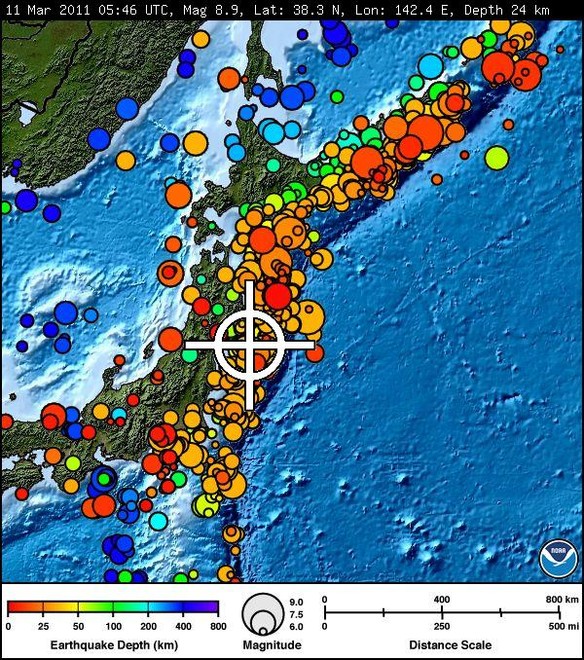Japan's fishing industry impacted by earthquake and tsunami
by Media Services on 22 Mar 2011

Japan earthquake 11/03/11 Pacific Tsunami Warning Center
http://www.weather.gov/
According to Japanese media, the earthquake and subsequent tsunami of 11 March have decimated the fishing industry of Kesennuma Port in Miyagi Prefecture.
The waters of the Sanriku coast are renowned as one of the world's richest fisheries, and its high-tech port was home to small local boats and a fleet of deep-sea boats that generally range hundreds of kilometers offshore.
The city's fish market, which handled 22.5 billion yen ($278 million) worth of fish in 2010 is destroyed and its wharf is strewn with smashed boats and cars. Most of the city is a wasteland. Hundreds of workers are without their boats and their jobs, while fuel, refrigeration and a lack of facilities mean everything is on hold.
All parts of the industry are at a standstill, including catching fish, unloading, processing and delivering products to consumers.
The tsunami washed away fishing boats and oyster farms, and many fishermen and fish farmers are now seeking refuge in evacuation centers.
The wharfside offices of many of the wholesalers who used to buy the fish and sell it to retailers have been smashed by the tsunami, and, even if fishermen are able to get out to sea, the fish markets and wharves in many ports are out of action.
Miyagi Prefecture boasts other prominent fishing ports, including Onagawa, Ishinomaki and Shiogama, and had the largest catch of any prefecture on Japan's main Honshu island before the earthquake.
But a fisheries cooperative association executive was quoted by Asahi.com as saying the city and Japan could not exist without its fleet.
In 2009, the total catch from fishing and fish farms reached 79.1 billion yen, the fourth largest in Japan as a whole. Its fisheries processing industry produced 281.7 billion yen in 2007, the second most in the country.
The Great East Japan Earthquake has brought the industry to its knees. Miyagi Governor Yoshihiro Murai said the prefecture's fishermen and fishery companies would have to start again from nothing.
The rest of Japan, and international markets, will soon feel the impact. The Tsukiji fish market in Tokyo handled only 1,639 tons of seafood transactions on Saturday, about 30 percent less than at the same time last year.
Major supermarkets have been unable to buy seafood from the Tohoku region. For the time being, fresh fish are likely to be replaced by imported, dried and frozen products in shops.
If you want to link to this article then please use this URL: www.sail-world.com/81585